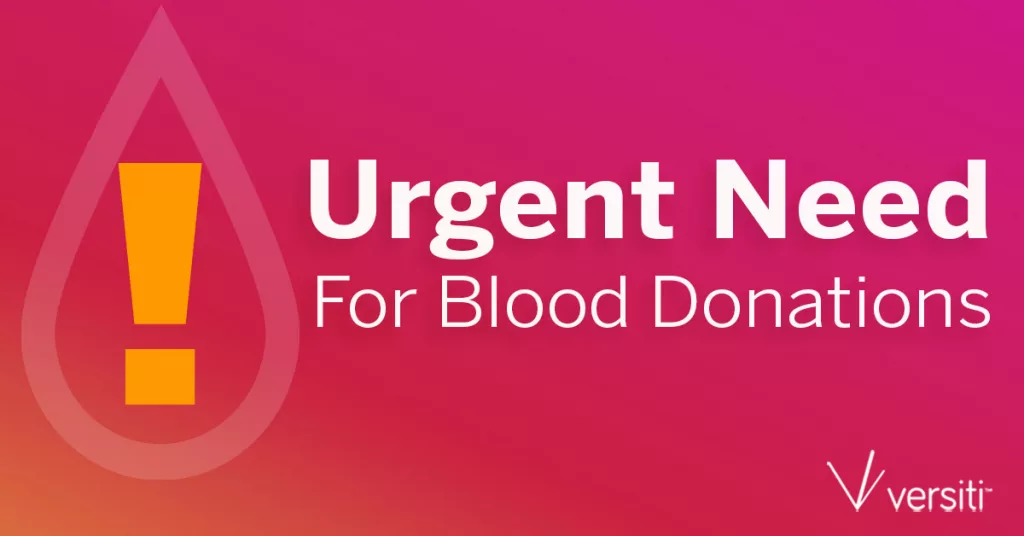Based on a dangerously low blood supply across Michigan, an emergency appeal for blood donations has been issued by Versiti Blood Center of Michigan, which has a major donor center in St. Joseph.
Versiti has issued the emergency appeal for blood donations after reporting that the available blood supply has dropped to a critically low level across the state, adding that blood types O-negative and O-positive among the most dire need.
Versiti is issuing the emergency appeal as communities throughout the state face a potential crisis with blood supplies dropping to critically low levels.
Dr. Dan Waxman, Vice President of Transfusion Medicine and Senior Medical Director at Versiti, says, “Versiti Blood Center of Michigan is urgently seeking help from the public. We need to do all we can to ensure that Michigan hospitals have the blood they need for their patients,” and warns, “As more people are getting vaccinated and getting out of their homes, attention has shifted away from blood donation. On top of that, drives at schools and businesses, which are typically Versiti’s largest source of blood donations this time of year, have been cancelled. All of this is creating a crisis situation – a shortage of much-needed blood.”
In Michigan, the state’s blood supply has dropped to a critically low level, with less than a day’s supply of life-saving blood on shelves to supply Versiti’s more than 80 hospital partners throughout the state. Ideally, Versiti strives for a three-day supply of blood available to its partner hospitals.
In the first quarter alone, compared to a typical year, Versiti Blood Centers is down more than 40-percent in donations – or nearly 20,000 units of blood – from schools and businesses.
Blood donors are needed now to help ensure life-saving blood is available for Michigan residents who need it. One donation of blood, which takes less than one hour, can help save up to three lives.
O-negative and O-positive blood donors are the most needed category now. O-negative and O-positive blood is the universal blood type, meaning donations can be transfused to all patients, including trauma victims, cancer patients and those undergoing surgery.
Michigan residents are needed to extend the generous gift of life to neighbors who need help and donate blood at a Versiti Blood Center of Michigan donor center nearest them:
- ST. JOSEPH: 2710 Cleveland Ave.
- GRAND RAPIDS: 1036 Fuller NE
- GRANDVILLE: 3140 Wilson SW
- KALAMAZOO AREA: 524 E. Milham Ave., Portage
- SAGINAW: 1771 Tittabawasee Rd.
- BAY CITY: 1017 N. Johnson St.
- MIDLAND: 825 E. Main St.
- TRAVERSE CITY: 2575 Aero Park Dr.
Michigan residents can also make an appointment to donate at a local community blood drive in their area. Times, dates and locations of upcoming local drives can be found online at: https://donate.michigan.versiti.org. Interested donors should click the “Schedule to Donate” tab to find the nearest drive to them.
To help ensure donor safety, everyone entering Versiti facilities must wear a mask and have their temperature taken. All Versiti donation locations are practicing social distancing and closely adhering to FDA and CDC cleaning and disinfecting protocols.
Donating blood takes about an hour with the actual donation taking 10-15 minutes. Anyone age 17 or older in good health who meets eligibility requirements is encouraged to give. Parental consent is required for donors age 16 to donate blood. Donors should bring a photo ID that includes their birth date.
Appointments are encouraged at any of Versiti’s Michigan donor centers or at any local community blood drive. Walk-ins are, however, always welcome. To schedule an appointment to donate blood, call 1-866-642-5663 or visit Versiti online at versiti.org/Michigan.
Versiti Blood Center of Michigan, formerly Michigan Blood, has collected blood throughout the state since 1955. Headquartered in Grand Rapids, the non-profit organization provides blood products and services to more than 80 Michigan hospitals. Versiti collects more than 114,000 units of blood each year in Michigan at eight donation centers and through the operation of more than 3,400 community blood drives throughout the state.






